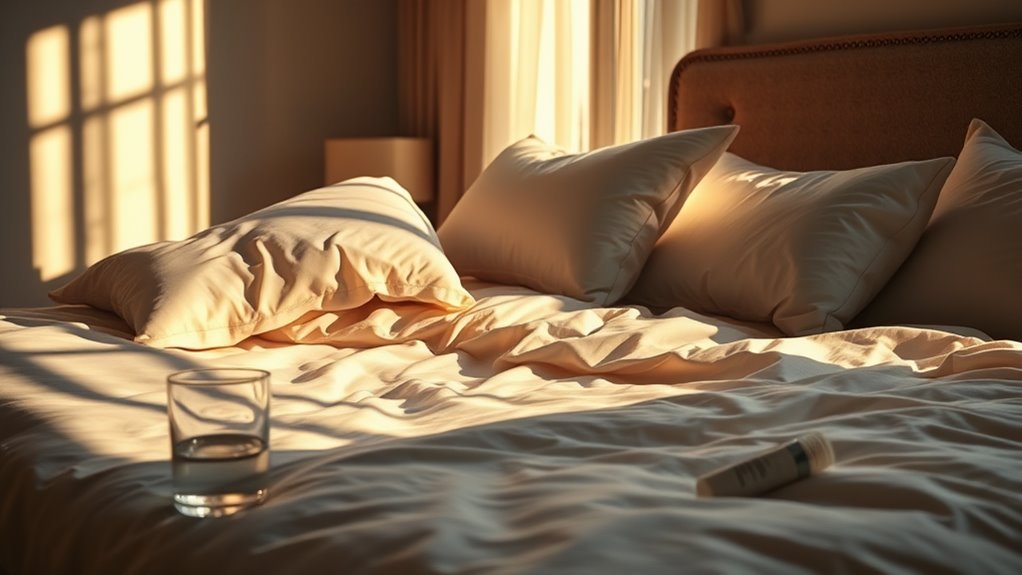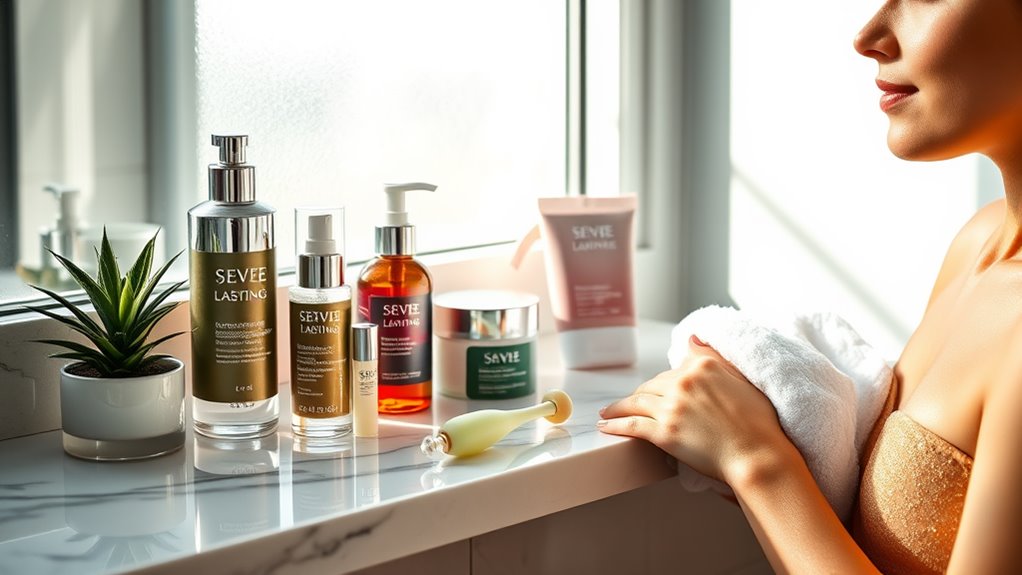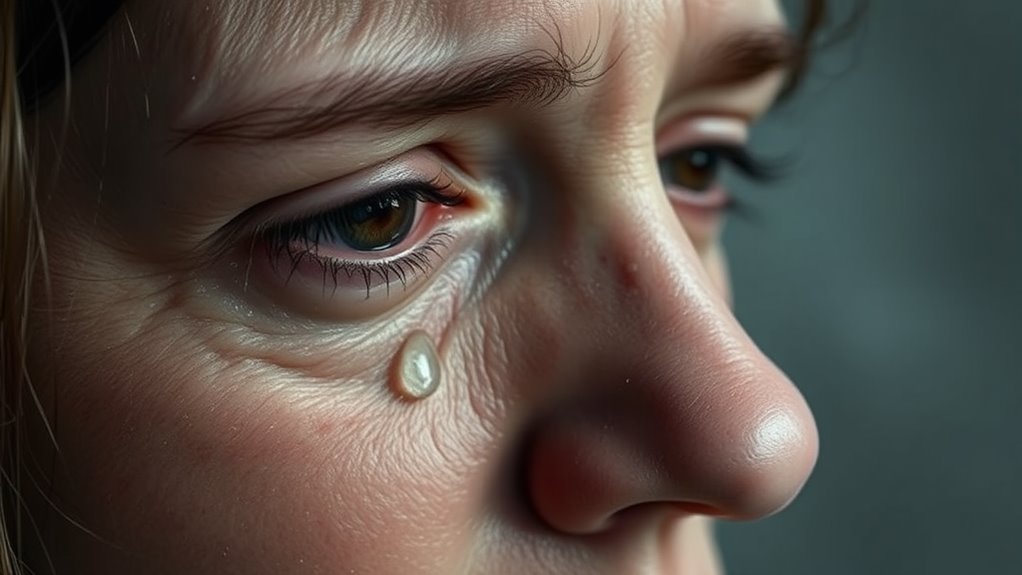These Sleep Habits Might Be Sabotaging Your Skin
Your sleep habits can significantly harm your skin health. Inadequate sleep increases inflammation and disrupts your skin’s repair ability, leading to dullness and breakouts. Irregular sleep schedules upset hormonal balance, worsening acne and signs of aging. Poor pillow hygiene adds bacteria that can trigger irritation, while sleep position affects the formation of fine lines. Improving your sleep quality can enhance your skin. Explore how to optimize your sleep for a healthier, more vibrant complexion.
Key Takeaways
- Inconsistent sleep schedules disrupt hormonal balance, increasing inflammation and worsening skin conditions like acne and dullness.
- Poor pillow hygiene allows bacteria and oils to accumulate, leading to breakouts and skin irritation.
- Side sleeping can cause friction and compression, contributing to fine lines and wrinkles on the face.
- Insufficient sleep reduces the skin’s repair capabilities, resulting in a dull complexion and heightened signs of aging.
- Lack of a calming bedtime routine can hinder sleep quality, negatively impacting skin health and appearance.
The Impact of Poor Sleep Quality on Skin Health
When you don’t get enough quality sleep, your skin pays the price. Research shows that inadequate sleep can lead to increased inflammation, reduced skin barrier function, and accelerated aging.
During deep sleep, your body repairs and regenerates cells, promoting a healthy complexion. Poor sleep habits for skin can manifest as dark circles, dullness, and breakouts. Furthermore, lack of sleep elevates cortisol levels, which can exacerbate acne and other skin conditions. To combat these effects, prioritize your sleep routine by creating a calming environment and establishing consistent sleep habits.
Additionally, chronic sleep deprivation can lead to premature aging and diminish the skin’s ability to recover from daily stressors. Aim for 7-9 hours of uninterrupted sleep each night to allow your skin to recover and rejuvenate effectively. Your commitment to quality sleep will reflect in your skin’s vitality and overall appearance.
Inconsistent Sleep Schedules and Their Effects
Inconsistent sleep schedules can significantly impact your skin health by disrupting the natural repair processes that occur during sleep. These fluctuations can lead to hormonal imbalances, which may exacerbate skin issues like acne and inflammation. Additionally, poor sleep quality can hinder the natural repair processes that your skin undergoes overnight. Understanding these effects can help you prioritize more regular sleep habits for better skin vitality.
Impact on Skin Health
A lack of a consistent sleep schedule can significantly undermine your skin health, as irregular sleep patterns disrupt the body’s natural circadian rhythms. This inconsistency can lead to increased signs of aging, such as fine lines and dullness. Your skin’s repair process primarily occurs during sleep, and without adequate rest, this process is hindered.
| Effect on Skin Health | Description |
|---|---|
| Increased Inflammation | Irregular sleep can elevate stress hormones. |
| Dull Complexion | Inconsistent sleep disrupts cell turnover. |
| Breakouts | Poor sleep can trigger acne flare-ups. |
| Dark Circles | Lack of sleep leads to poor blood circulation. |
| Premature Aging | Inconsistent sleep accelerates collagen breakdown. |
Hormonal Fluctuations Explained
Sleep disruptions can cause significant hormonal fluctuations that affect your skin’s appearance and health.
When you maintain an inconsistent sleep schedule, cortisol levels can rise, leading to increased stress and inflammation. Elevated cortisol can trigger excess oil production, resulting in acne breakouts and a dull complexion.
Moreover, sleep deprivation may disrupt the balance of growth hormone and melatonin, both crucial for skin repair and regeneration. A lack of melatonin can also impair your skin’s barrier function, making it more susceptible to environmental damage.
To promote optimal skin health, aim for a consistent sleep routine that supports hormonal balance. Prioritize restorative sleep to enhance your skin’s resilience and overall appearance.
Your skin will thank you for it.
The Role of Pillow Hygiene in Skin Care
While you might focus on your skincare routine, the cleanliness of your pillowcase plays a crucial role in maintaining healthy skin.
Pillowcases can harbor bacteria, oils, and dead skin cells, which can lead to breakouts and irritation. Studies show that changing your pillowcase at least once a week can significantly reduce the risk of acne and other skin issues.
Additionally, using breathable fabrics like cotton can help wick away moisture, preventing the growth of bacteria. Certain fabrics can also exacerbate skin conditions due to their texture and ability to retain heat.
To elevate your pillow hygiene, consider washing your pillowcase in hot water with a gentle detergent, ensuring it’s free from irritants.
Sleep Position and Its Influence on Skin Aging
Your sleep position can significantly impact your skin’s aging process. Side sleeping may lead to increased wrinkles and creases due to prolonged pressure on your face, while back sleeping is often recommended for its potential skin benefits. Additionally, the material of your pillow can either exacerbate or alleviate these effects, making it essential to choose wisely. Incorporating better sleep habits into your routine can further enhance your skin’s appearance and health.
Side Sleeping Effects
Choosing to sleep on your side can significantly impact the aging of your skin. This sleep position often leads to increased friction between your face and the pillow, which may contribute to the formation of fine lines and wrinkles.
Additionally, side sleeping can compress facial tissues, hindering natural blood flow and lymphatic drainage. Over time, this pressure may result in uneven skin tone and puffiness.
Furthermore, the accumulation of oils and bacteria on your pillowcase can exacerbate breakouts, compromising your skin’s overall health.
To mitigate these effects, consider investing in a silk pillowcase or practicing a skincare routine that includes hydration and protection. Being mindful of your sleep position is essential for maintaining youthful, radiant skin.
Back Sleeping Benefits
Sleeping on your back offers several advantages for skin health, particularly in the prevention of premature aging. This position minimizes direct pressure on your face, reducing the risk of sleep lines and wrinkles caused by compression against a pillow.
When you sleep on your back, your skin has the chance to breathe more freely, promoting better oxygen flow and circulation. This enhanced blood flow aids in the delivery of nutrients essential for skin repair and rejuvenation.
Additionally, back sleeping can help maintain facial symmetry, preventing the asymmetry often seen with side sleeping. By prioritizing this position, you’re not just improving your sleep quality; you’re actively contributing to a more youthful and radiant complexion over time.
Pillow Material Matters
When it comes to maintaining youthful skin, the material of your pillow plays a crucial role in how your sleep position affects skin aging.
If you’re a side sleeper, cotton pillows can cause friction, leading to creases and fine lines. Consider switching to silk or satin, which reduce friction and help maintain skin moisture. These materials are gentler on your skin, minimizing irritation and potential breakouts.
Additionally, hypoallergenic options can prevent allergic reactions that exacerbate skin issues. Choosing the right pillow not only supports your head and neck but also enhances your skincare efforts.
Ultimately, investing in a quality pillow can significantly impact the longevity and appearance of your skin, making it a simple yet effective change in your routine.
The Connection Between Stress, Sleep, and Skin Issues
Although many people underestimate the impact of stress on their overall well-being, it’s crucial to recognize how it intertwines with sleep quality and skin health.
When you experience stress, your body releases cortisol, a hormone that can lead to increased oil production and inflammation, exacerbating skin conditions like acne and eczema.
Poor sleep, often a byproduct of stress, further complicates this relationship. Insufficient rest impairs your skin’s ability to repair itself, resulting in dullness and a compromised barrier.
Additionally, sleep disruption can trigger inflammatory responses, worsening existing skin issues. Furthermore, understanding the hidden effects of stress on skin health can empower you to take proactive measures for improvement.
Tips for Improving Sleep for Better Skin Health
To enhance your skin health, prioritizing restorative sleep is essential. Start by establishing a consistent sleep schedule; going to bed and waking up at the same time daily regulates your body’s internal clock.
Create a calming bedtime routine, incorporating activities like reading or gentle stretching to signal your body it’s time to wind down. Limit exposure to screens at least an hour before bed, as blue light can interfere with melatonin production.
Ensure your sleep environment is conducive to rest; consider a cool, dark room and invest in quality bedding.
Lastly, manage stress through mindfulness practices, such as meditation or deep-breathing exercises, to promote deeper, more restorative sleep, ultimately benefiting your skin’s appearance and health.




